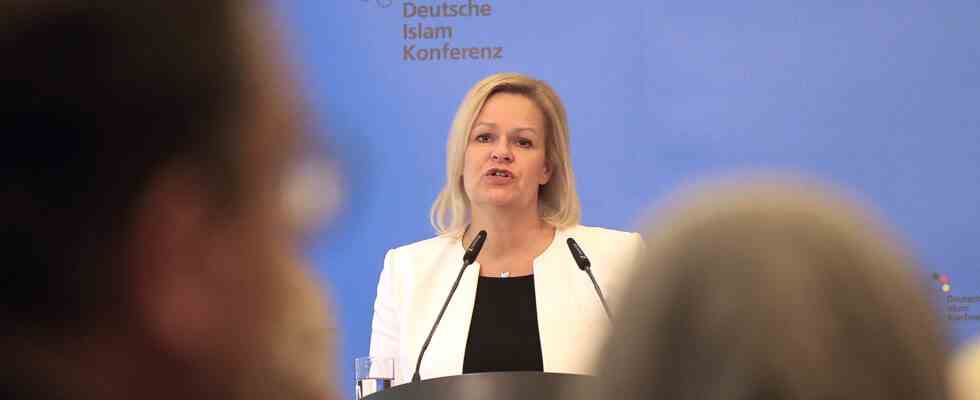Status: 12/07/2022 5:17 p.m
Most imams from abroad preach in German mosques. Interior Minister Faeser wants to change that, as she said at the Islam Conference. Islamophobia must also be combated more vigorously.
According to Interior Minister Nancy Faeser (SPD), the influence of foreign imams on Islamic communities in Germany should be significantly reduced. “I want to gradually reduce the government posting of imams from abroad to Germany, with the aim of ending them,” she said at the start of the German Islam Conference (DIK) in Berlin. This applies in particular to Turkey.
Faeser emphasized that German-speaking imams, who are also familiar with the reality of life in Germany, are also in the interests of the communities. Fewer foreign dependencies or influence made it easier for German Muslims to feel at home in Germany with their faith. Her ministry is already in contact with the Turkish religious authorities.
talks in Turkey
Faeser’s State Secretary in the Ministry of the Interior, Juliane Seifert, said that imams should be rooted in German society and be able to build bridges in sport and culture. This is an important point. She had been in Turkey for talks on this topic last week. It’s not about ending the sending of imams from one day to the next, but about agreeing on a binding path together.
The Turkish-Islamic Union of the Institute for Religion (DITIB) is now training some of its staff at its own center in the Eifel. In addition, the Islamkolleg Deutschland was founded at the end of 2019 as a facility for practical Islamic theological training in Osnabrück. Here, too, German-speaking imams and other religious support staff are to be trained – independently of the association. The training of imams in Germany has already been a focus of the DIK in recent years under the then Minister of the Interior Horst Seehofer (CSU).
In the run-up to this year’s Islam Conference, there had been criticism that sensitive issues were being left out. The publicist Ahmad Mansour noted that presidential elections are due in Turkey next year. Therefore, it must now be discussed whether DITIB is again doing propaganda for President Recep Tayyip Erdogan. According to the University of Osnabrück, the Turkish government alone finances 800 to 900 imams in Germany every year. They are considered to be the best-paid imams in Germany.
Combating Islamophobia as a priority
In addition to imam training, Faeser also wants to focus more on combating anti-Muslim hostility in Germany. The same applies to anti-Semitism by Muslims, but also to intolerance among Muslims or towards other social groups, she explained. The federal government has commissioned a major study on the subject of hostility towards Muslims, which focuses on the situation of those affected. The first results are expected next summer.
The spokesman for the Muslim Coordination Council, Eyüp Kalyon, who is responsible for training imams at DITIB, said he had not personally experienced any hostility towards Muslims. Muslim women who wear a headscarf in particular often reported “experiences of exclusion”. Kalyon also pointed to progress in the training of religious personnel in Germany and spoke of a “process of change”. This year, DITIB had 25 graduates from the two-year training program who were active in several federal states. The new course has 36 participants. However, he warned that most communities are not able to pay an imam.
The director of the Center for Islamic Theology at the Westfälische-Wilhelms-Universität Münster, Mouhanad Khorchide, meanwhile criticized the fact that the mosque associations are still organized according to countries of origin. To date, it has not happened that an imam from Morocco preaches in a DITIB mosque or a preacher with Turkish roots in a mosque founded by native Moroccans. The imam job must also become more attractive overall. The pay is usually bad, the dependency in the employment relationship is high.
“No Security Conference”
The Islamic associations have repeatedly criticized that the DIK focuses too much on security issues and radical Islamism. Faeser now emphasized: “The Islam Conference is not a security conference.” She expressly supports the decision made in the past to exclude security issues. Muslims should not be placed under general suspicion of security.
Faeser also rejected criticism that areas such as Islamic extremism were being neglected: “The BMI and the entire federal government, together with the security authorities, give this issue a high priority – also in cooperation and in dialogue with Muslims and Muslim organizations.”
In a guest article for the “Frankfurter Allgemeine Zeitung”, a group of Union politicians and scientists from the field of Islamic theology, among others, called for Islamism to be discussed at the conference. They argued that Islamist forces in particular would permanently undermine the better cooperation that the federal government was striving for. The authors also criticized the fact that academic and social research into Islamism has so far been avoided in Germany.

